Login Status
-
Free text
UPCOMING EVENTS:
 From August 18 to October 11, 2026; submissions due February 19.
From August 18 to October 11, 2026; submissions due February 19.FILE – Electronic Language International Festival is now accepting project submissions and invites artists, researchers, creators, and developers to participate in its next edition. An international reference in the fields of art, technology, and innovation, FILE will take place in … Continue reading →
 Wrocław University of Environmental and Life Sciences, 4th of Match 2026
Wrocław University of Environmental and Life Sciences, 4th of Match 2026The international conference “Cross-border cooperation in the era of challenges and transformation – space, energy, climate, culture” will be held on 4 March 2026 at the Wrocław University of Environmental and Life Sciences, in Wrocław, Poland. The conference will explore key issues facing border regions, from … Continue reading →
Topic: digital preservation
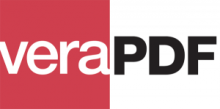
Version 0.8 is the latest release of veraPDF conformance checker for PDF/A. It features a re-designed command line interface (CLI) for validation and feature extraction. All interested users are invited to download and test the software from the PREFORMA Open Source Portal and report possible problems, issues or suggestions to the project’s GitHub issue tracker. Your feedback is important, it will contribute to improving the software. Continue reading
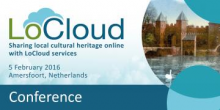
This conference organised by the LoCloud project provides an opportunity to share, discuss and demonstrate tools, services and content in the context of Europeana. With showcases from LoCloud content partners and interesting speeches, the conference will reflect on the results achieved … Continue reading
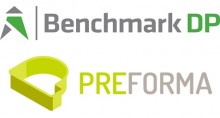
A new agreement has been signed between PREFORMA and BenchmarkDP to explore how the methodologies and approaches of BenchmarkDP could be useful in PREFORMA in establishing an objective frame of reference for the evaluation of the conformance checkers, and how the practical challenges in PREFORMA can inform the work in BenchmarkDP. The cooperation kicked-off during a workshop organised by BenchmarkDP in the framework of IPRES 2015. Continue reading

Applications are invited from candidates who possess the necessary qualifications in order to fill one (1) full time Marie Curie Early Stage Researcher (ESR) Fellow Position in the Digital Heritage Research Lab of the Cyprus University of Technology (CUT) in … Continue reading
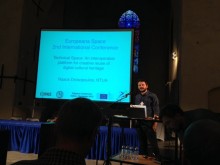
Represented by the gracious cornflower, the national symbol of Estonia, the II Europeana Space International Conference took place in Tallinn on 10-11 December 2015. This event, organized by the Estonian Ministry of Culture, intended to generate new perspectives for the wider … Continue reading
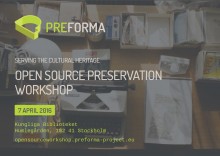
We warmly invite you to the Open Source Preservation Workshop – Serving the Cultural Heritage. The Workshop will offer attendees the opportunity to learn how to use the conformance checkers and to meet the community which has been established around these tools. Don’t miss this opportunity to get to know us! Continue reading
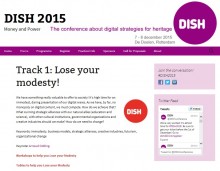
Europeana Space and the Europeana TV pilot were extensively presented at DISH 2015 in Rotterdam, an important biannual conference about digital strategies for heritage. A table session was chaired by Greg Markus (NISV), under the title: Adding another layer: Europeana Space … Continue reading
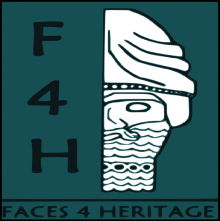
Launched by USI Università della Svizzera italiana (a Swiss cantonal university based in Lugano, Canton Ticino, Switzerland), this initiative is endorsed by UNESCO and intends to promote peace through heritage preservation. USI recognizes together with UNESCO that “Heritage is our legacy from the past, … Continue reading

The EUscreenXL project is holding an international conference on curation of audiovisual heritage. The conference takes place on December 3 and 4 in Warsaw at the National Audiovisual Institute (NInA). It is organised by the best practice network for Europe’s … Continue reading
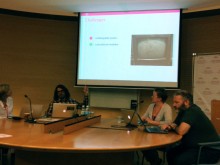
On 8 and 9 November 2015 the EVA / MINERVA 12th annual international conference for professionals in cultural heritage took place at the Van Leer Institute in Jerusalem. At the event, focused on the preservation and dissemination of cultural heritage … Continue reading
































